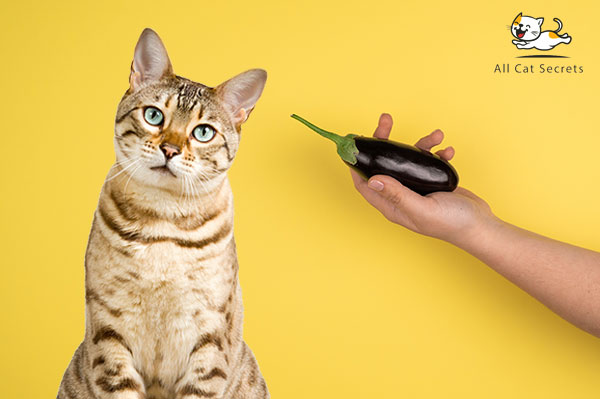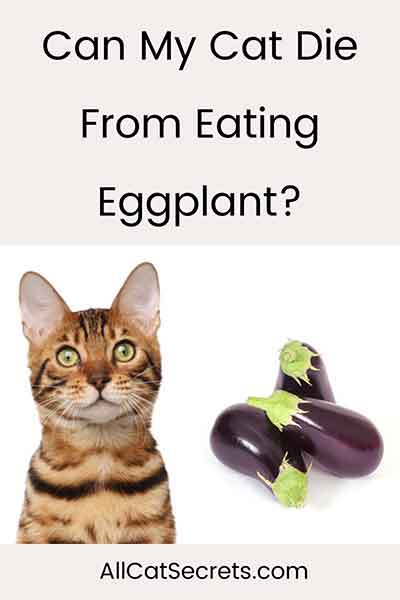It doesn’t matter whether you’ve owned a cat for one day or your entire life. You must instinctively know that there are certain foods which you can safely give your cat and those that could cause devastating side effects.
Since cats are obligate carnivores, their diet should comprise more than 80% lean meat. But that’s not to mean your cat will drop dead if he snacked on plant-based foods like fruits and vegetables.
In fact, a small amount of some fruits and veggies can aid your cat’s digestion and even supplement his main diet of meat. Plus, nearly every fruit is loaded with powerful antioxidants noted for their favorable effects on immunity.
However, you should also instinctively know that not every fruit or vegetable is safe for cats. That takes us back to our main question, can cats eat eggplant?
Unfortunately, cats shouldn’t eat eggplant. Eggplant is one of the many fruits considered toxic to cats. The toxicity of this fruit mainly comes from solanine, a glycoalkaloid poison in the plant.
The only saving grace with eggplants for cats is that very small amounts of the fruits probably won’t make your cat sick. Even then, you want to tread with caution when handling eggplants in a household with cats.
Read on for a definitive guide into cats and eggplants.
Table of Contents
Is Eggplant Ok For Cats?
Cats are inherently inquisitive creatures.
If you love eggplants and also happen to own a cat, you’ll usually notice that your feline friend becomes curious whenever he catches you snacking on this fruit. As a concerned pet parent, you may begin to wonder – is it safe for cats to eat eggplant?
But is eggplant safe for cats?
The answer is a resounding NO. Eggplants are not safe or good for cats. That’s because these fruits are loaded with the toxin solanine.
Solanine plays a crucial role in aiding the normal growth and development of eggplants. But interaction with this compound could trigger several adverse effects in cats.
- High protein cat food dry formula with real chicken as the first ingredient
- Natural with prebiotic fiber nourishes specific intestinal bacteria for digestive health
- Wholesome cat food dry kibble with vitamin A and Omega-6 fatty acids to nourish skin and coat
Last update on 2025-04-16 / Affiliate links / Images from Amazon Product Advertising API
More About Eggplants
Eggplant is an edible fruit that grows on a tree of the same name. Scientifically known as Solanum melongena, eggplant belongs in the nightshade family Solanaceae. That’s the same family as tomatoes, potatoes, and chili peppers.
Eggplant goes by several other names, depending on the region it’s cultivated. The name ‘eggplant’ is more commonly used in the United States, Australia, New Zealand, and parts of Canada.
The fruit is known as aubergine in the United Kingdom, Ireland, and Quebec – Canada. In the Indian subcontinent, Malaysia, Singapore, and South Africa, eggplant is more famously known as brinjal.
Despite the numerous names or where it’s cultivated, one thing’s for sure – eggplant fruits are sweet and nutritious. The fruits are purple and spongy. They can be eaten raw as a standalone fruit or mixed into salads and desserts. They can also be included in recipes of several cuisines, in which case they’re viewed a vegetable.
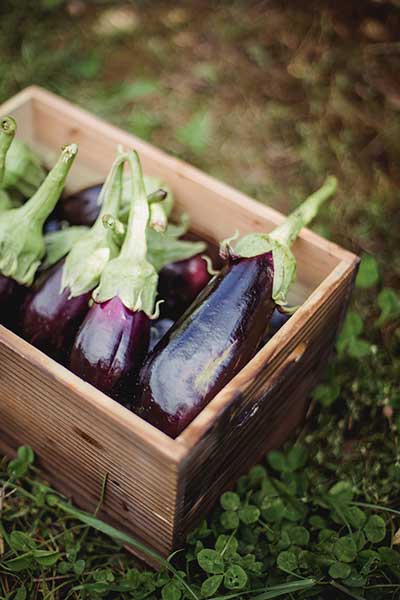
Eggplant’s Nutritional Value
A 100-gram serving (about 3.5 ounces) of raw eggplant has the following nutritional value;
- Energy – 104 kilojoules (25 kilocalories)
- Water – 92.0 grams
- Protein – 1.0 gram
- Carbohydrates – 6.5 grams
- Sugars – 3.5 grams
- Fiber – 3 grams
- Fat – 0.2 grams
- Vitamin B1 (Thiamine) – 3% of the recommended daily value (RDV)
- Vitamin B2 (Riboflavin) – 3% of the RDV
- Vitamin B3 (Niacin) – 4% of the RDV
- Vitamin B5 (Pantothenic acid) – 6% of the RDV
- Vitamin B6 – 6% of the RDV
- Vitamin B9 (Folate) – 6% of the RDV
- Vitamin C – 3% of the RDV
- Vitamin E – 2% of the RDV
- Vitamin K – 3% of the RDV
- Manganese – 11% of the RDV
- Potassium – 5% of the RDV
- Magnesium – 4% of the RDV
- Phosphorus – 3% of the RDV
- Iron – 2% of the RDV
- Zinc – 2% of the RDV
- Calcium – 1% of the RDV
Based on the above nutritional profile, it’s evident that eggplant contains a considerable amount of macronutrients and micronutrients.
However, the RDV values are based on human consumption. Which begs the question, can cats have eggplant too?
Again, the answer is no. Cats shouldn’t have eggplant and the following section explains why.
- DOG SKIN AND COAT SUPPLEMENT: Loaded with Omega-3 fatty acids, this skin and coat supplement for dogs and cats supports your pet's...
- NATURAL IMMUNE SUPPORT: The EPA and DHA in our dog supplements formula fortify the immune system, supporting health and wellness...
- FOOD TOPPER: This liquid formula is suitable as a dog and cat food topper. For pet parents looking for an alternative to capsules,...
Last update on 2025-04-16 / Affiliate links / Images from Amazon Product Advertising API
Risks of Eggplant for Cats
Solanine poisoning is the greatest problem with eggplants for cats. What makes the situation more dire is that even what appears to be small amounts of aubergine may prove disastrous for your cat.
The following are common symptoms of eggplant toxicity in cats;
- Nausea
- Vomiting
- Loss of appetite
- Throat irritation
- Diarrhea
- Dehydration resulting from vomiting and diarrhea, usually characterized by dry eyes or mouth
- Constipation
- Abdominal pain
- Drooling or hypersalivation
- Fatigue
- High or low heart rate
- Fever
- Slow reflexes
- Unusual behavioral changes, such as withdrawal, aggression, or non-active demeanor
The severity of solanine poisoning symptoms will depend on the amount consumed as well as your cat’s age, breed, and general health condition.
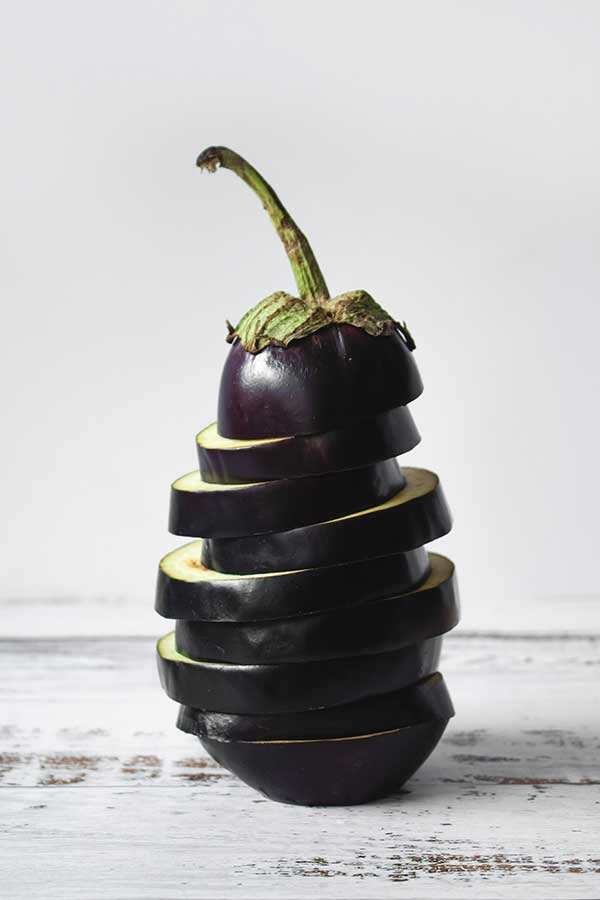
The higher the portions eaten, the more severe the symptoms will be. That’s especially if the cat is eating eggplant for the first time.
Kittens and smaller cat breeds will bear the brunt of solanine poisoning compared to adult cats or larger cat breeds. That’s because kittens and smaller cat breeds have a larger surface area to volume ratio. Therefore, it takes a shorter duration for the toxins in eggplant to enter their bloodstream. Besides, the stomachs of kittens is easily irritated by unfamiliar plant-based foods.
In terms of the general medical condition, sick cats shouldn’t eat eggplant at all costs. The same applies to cats recovering from a surgical operation as well as pregnant and nursing cats.
Is Eggplant Poisonous To Cats?
Eggplant is poisonous to cats. The toxicity of this fruit mainly comes from the chemical solanine. As a loving and responsible cat owner, it’s best to avoid serving eggplant to your little furball. Remember that even a seemingly tiny amount could trigger life-threatening symptoms.
Is eggplant bad for cats then?
The fact that eggplant is toxic for cats means the fruit is equally bad for them. Your cat may not necessarily drop dead immediately after eating eggplants. But the risks of side effects are always there. And by the time the symptoms of solanine poisoning strike, the situation usually has already escalated.
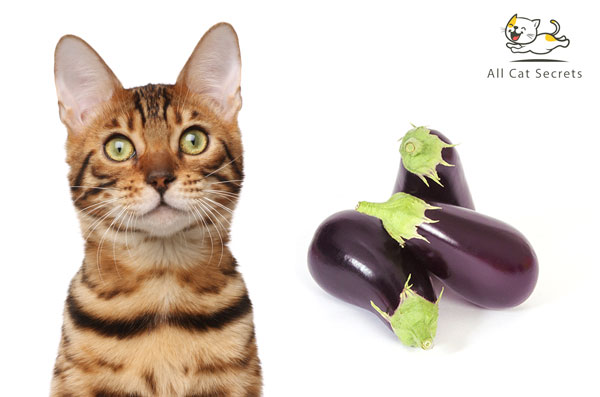
Can My Cat Die From Eating Eggplant?
There may not be considerable statistics of feline deaths resulting directly from ingesting eggplant. But that’s not to mean that this fruit cannot kill your cat.
Your feline friend could die from solanine poisoning if you do not move with speed to mitigate the symptoms. It’s worse if dealing with a young and/or sick cat.
Does It Matter What Part Of The Eggplant Your Cat Eats?
No matter the part of the aubergine plant that you give your cat, it still contains solanine.
Perhaps you’ve always wondered, are eggplant leaves poisonous to cats?
Eggplant leaves are just as toxic to cats as eggplant flesh, eggplant skin, eggplant seeds, and any other part of the plant.
In fact, the toxin solanine is usually concentrated in raw eggplant leaves. That makes eggplant leaves even more dangerous for cats.
Besides, eggplant leaves, skin, and seeds may present additional choking hazards for your cat.
- Cat Probiotics: 1st Ever Made USDA Certified Organic Liquid Probiotics for Cats/Felines. 30-90 Day Supply 4oz Glass Bottle. 100%...
- Proprietary Strains for Cats: Isolated strains known to be useful uniquely to our feline friends. Our Cat Probiotics include a...
- Multiple Benefits
Last update on 2025-04-16 / Affiliate links / Images from Amazon Product Advertising API
Is Eggplant Safe For Cats In Some Situations?
So far, we’ve examined the toxicity of raw eggplant for cats. You could now be wondering if cooked aubergine can be safer for your cat to consume.
But can cats eat cooked eggplant, or is cooked eggplant bad for cats?
The intensity of solanine in aubergine may reduce considerably after cooking the fruit. So, if you must feed eggplant to your cat, you’re better off cooking it first. Just remember to peel the skin and remove the seeds to minimize choking risks. Then, wash the fruit in clean water before cooking it.
This is the part where you’d be wondering, can cats eat fried eggplant?
Frying isn’t the best way to cook eggplant for cats. That’s because this cooking method typically involves using too much fat, salt, and spices, none of which is safe for cats. The best way to feed cooked eggplant to cats is by boiling or steaming the fruit.
Can cats eat raw eggplant too?
Cats shouldn’t eat raw eggplant. If you must give eggplant to your kitto, it’s best to cook the fruit first.
However, note that cooked eggplant is only less toxic to cats but not entirely safe. The fruit (or whichever part cooked) may still contain solanine concentrations high enough to trigger poisoning.
What to Do If My Cat Ate an Eggplant?
If eggplant is a staple fruit on your kitchen shelf, you can only manage to keep it out of your cat’s reach long enough. There will be days when your cat sneaks up behind your back and helps himself on this fruit. Therefore, it’s important to know what to do if your cat eats eggplant.
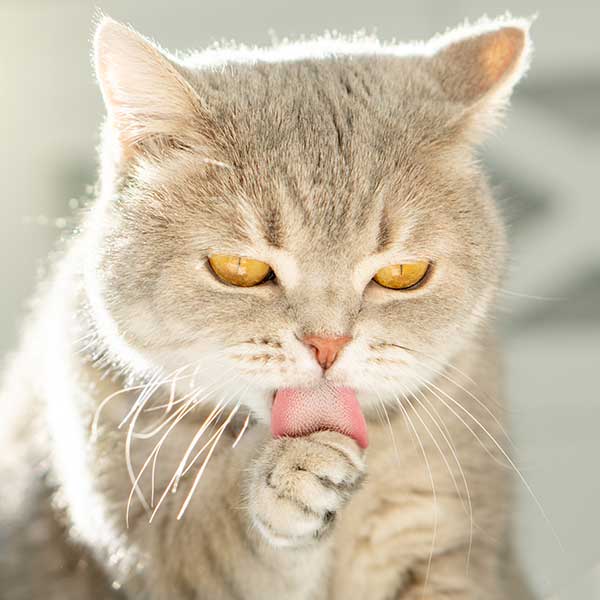
The first course of action is to watch out for the side effects. Note that the onset time and severity of solanine poisoning symptoms will depend on the amount consumed.
Some of the adverse effects, such as dehydration, can be managed by offering your cat more water or broth. The goal is to stabilize the cat long enough as you plan to take him for a professional checkup.
When you visit the vet, it’s important to provide them with enough information that could help save your cat’s life. That includes the estimated amount of aubergine consumed, the duration from exposure, and some of the early symptoms.
The vet will examine your cat and administer the right treatment based on the severity of the condition.
How to Stop My Cat From Eating Eggplants?
When it comes to eggplants for cats, prevention is always better than cure. The good news is that there are numerous tips you can implement to keep this fruit from your cat’s reach.
You could consider wiping the table and counters clean after consuming eggplant. It’s also recommended to fence off all eggplant plants growing in your backyard.
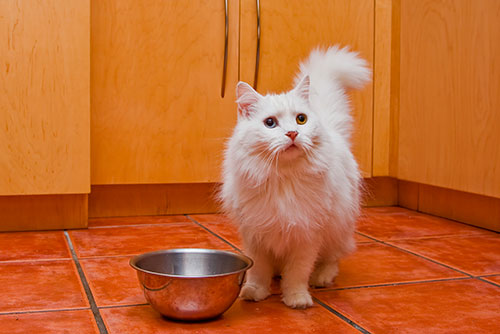
Conclusion
Eggplant is one of the most nutritious fruits for humans. However, the fruit is ranked among the plant-based foods that cats shouldn’t eat.
Eggplant contains the toxin solanine, which might trigger several gastrointestinal symptoms in cats. So, it’s important to move with speed if you suspect that your cat ate eggplant. That basically includes booking an appointment with your vet immediately.
Checkout Our Favorite Cat Products
1. Best Online Course For Cat Parents
Our favorite: The Cat Language Bible (How to Finally Understand And Speak to Your Cat) – A new form of cat to human communication that many cat owners have dreamed about… but few have actually thought possible.
2. Best Immune Support For Cats
Our favorite: Tomlyn Immune Support – Best Supplement for Cats and Kittens.
3. Best Cat Treats
Our favorites: LIFE ESSENTIALS All Natural Freeze Dried Chicken And Sheba Meaty Tender Sticks – Both are Great.

